 Petzlover
Petzlover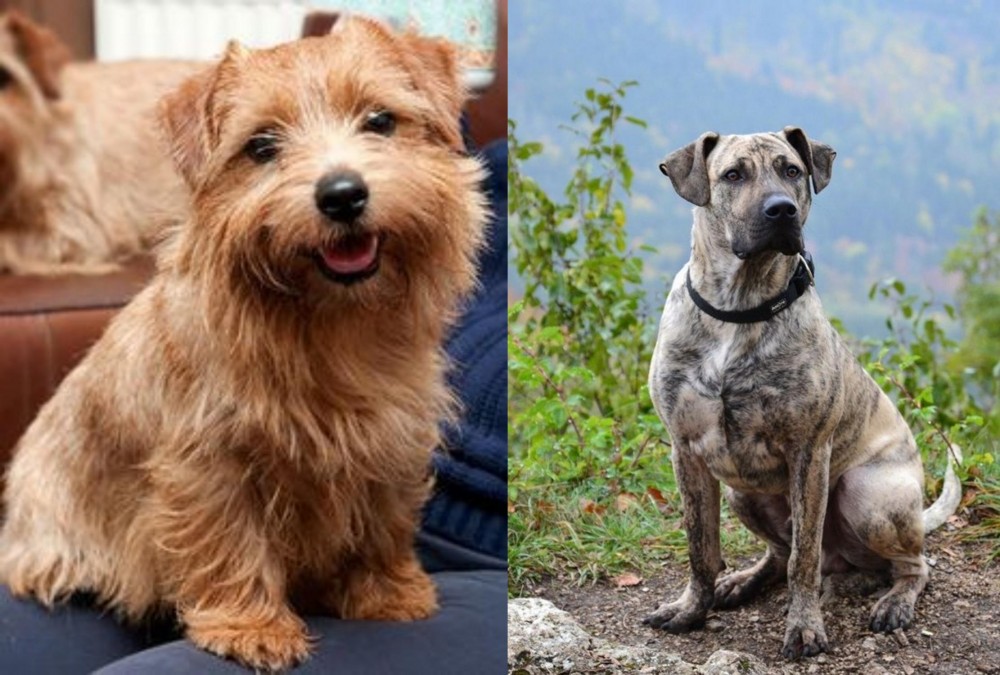 Norfolk Terrier is originated from United Kingdom but Perro Cimarron is originated from Uruguay. Norfolk Terrier may grow 35 cm / 13 inches shorter than Perro Cimarron. Norfolk Terrier may weigh 39 kg / 85 pounds lesser than Perro Cimarron. Both Norfolk Terrier and Perro Cimarron has almost same life span. Norfolk Terrier may have less litter size than Perro Cimarron. Norfolk Terrier requires Moderate Maintenance. But Perro Cimarron requires Low Maintenance
Norfolk Terrier is originated from United Kingdom but Perro Cimarron is originated from Uruguay. Norfolk Terrier may grow 35 cm / 13 inches shorter than Perro Cimarron. Norfolk Terrier may weigh 39 kg / 85 pounds lesser than Perro Cimarron. Both Norfolk Terrier and Perro Cimarron has almost same life span. Norfolk Terrier may have less litter size than Perro Cimarron. Norfolk Terrier requires Moderate Maintenance. But Perro Cimarron requires Low Maintenance
 It was in the 1880s that a working terrier was developed in eastern England. The Norfolk Terrier was developed by crossing local terrier-like dogs with the Irish Terrier breed as well as small red terriers.
It was in the 1880s that a working terrier was developed in eastern England. The Norfolk Terrier was developed by crossing local terrier-like dogs with the Irish Terrier breed as well as small red terriers.
Known first as the Cantab Terrier and then later as the Trumpington Terrier, the name changed further but in 1932, the Norwich was accepted into the English Kennel Club and the first written standard was created.
The Norfolk Terrier was recognized by the United Kennel Club in 1979. It has gained recognition as an independent breed but is a variety of the Norwich Terrier, distinguished from it by having floppy ears and not erect ears. Both the Norfolk- and Norwich are the smallest of the working terriers.
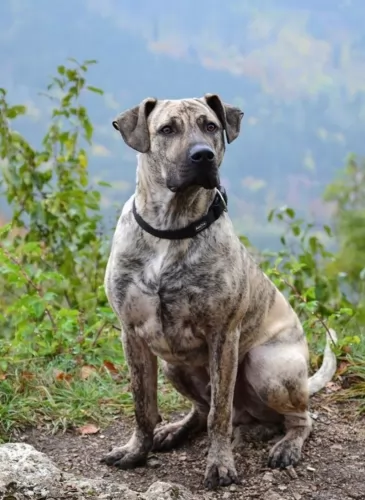 The Perro Cimarron, also known as the Uruguayan Cimarron is a molosser type dog which originated in Uruguay. The dog is believed to have descending from European dogs which were brought to the country by early colonizers.
The Perro Cimarron, also known as the Uruguayan Cimarron is a molosser type dog which originated in Uruguay. The dog is believed to have descending from European dogs which were brought to the country by early colonizers.
These dogs are the official mascot of the National Army of Uruguay. The dog is also recognized in Uruguay as well as by the Federation Cynologique Internationale. The dog was exported to the United States and then recognized by the United Kennel Club in the category Guardian Dog.
 The Norfolk Terrier is a small purebred dog, standing at 23 to 25cm in height and weighing roughly between 4.5kg and 6kg. The dog has a wire-haired coat which can be in different colors such as wheaten, red, black and grey or grizzle.
The Norfolk Terrier is a small purebred dog, standing at 23 to 25cm in height and weighing roughly between 4.5kg and 6kg. The dog has a wire-haired coat which can be in different colors such as wheaten, red, black and grey or grizzle.
The hair on his head and ears is shorter and smoother and he has longer whiskers and eyebrows. The chest is deep, the front legs are short and straight and the tail has always been docked to half its length but left long these days. The tail is set high and carried erect.
Norfolks are feisty, fearless dogs with an independent streak. They’re gentle though, and when it comes to being a companion dog, they get on well with children and other pets. They thrive on their human family’s companionship and wouldn’t do well at all if they were constantly left outside.
They’re not yappy dogs but will bark occasionally so he can sound the alarm if strangers approach.
This little dog is able to live in the city or the countryside, but just because he is little, you can’t neglect his exercise needs. He will most certainly need to be exercised every day and taken for walks as he is an energetic, lively dog. He is intelligent too and easy to train and socialize, turning him into such an obedient, pleasurable pet.
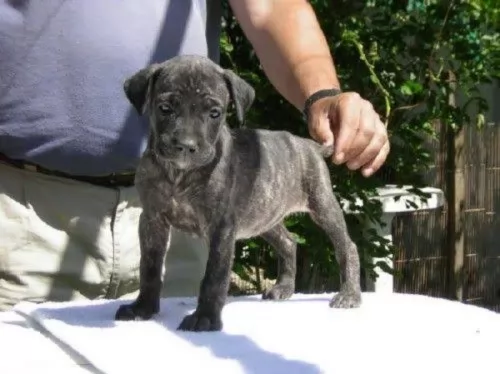 The Perro Cimarron is a large dog standing at between 58 to 61cm and weighing 38 to 45kg, both males and females.
The Perro Cimarron is a large dog standing at between 58 to 61cm and weighing 38 to 45kg, both males and females.
He is a muscular dog with the coat being short and smooth and in a pale fawnish color or brindle and with a black face.
The Uruguayan Cimarron is a multi-purpose working dog but today he is mainly a family companion. This large mastiff type dog is muscular and athletic. He has a large head, the ears are high set and floppy but sometimes they are still cropped and made erect. The tail is thick, low set and reaches to the hock. He has a black nose, brown eyes and a black mask.
Strong, alert, self confident and brave, the Perro Cimarron may not have a particularly friendly face but he loves his human family and is loyal to them. He is calm and cool but even so, he will need to be trained and socialized and then he becomes calm around different people and in different situations. He is a dog that can get on well with children and pets in the home.
 Fearless and brave, the Norfolk Terrier promises to be a wonderful companion.
Fearless and brave, the Norfolk Terrier promises to be a wonderful companion.
They're social, loving dogs and want to be part of the household. He is lively and active too and wants to be included in your walks and your games. He loves nothing more than to be running across a field after a ball.
They’re such amicable pets that they make great dogs for first-time dog owners. Let him into your heart and your home – he makes such a splendid pet – that once you’ve had one, you’ll realize you can never be without such a wonderful pet and companion again.
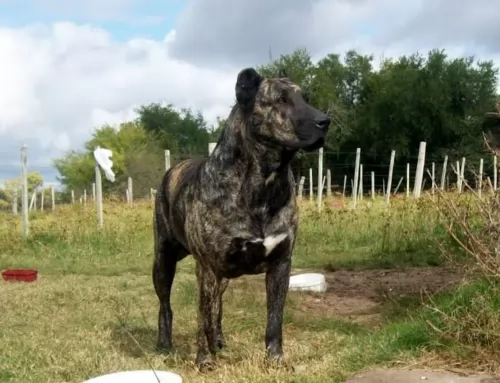 The Uruguayan Cimarron is not looked upon as a pet for the first time dog owner. He is strong willed, stubborn, somewhat aggressive and independent and will require a strong, firm, consistent owner.
The Uruguayan Cimarron is not looked upon as a pet for the first time dog owner. He is strong willed, stubborn, somewhat aggressive and independent and will require a strong, firm, consistent owner.
He will make a loyal, affectionate pet for the person who takes time to socialize and train him. He also makes a good watchdog.
The way any dog breed is brought up will determine how he turns out, and if this particular dog is brought up the right way and given the right amount of care and exercise he needs, he can make as good a pet as any other dog breed.
 The life expectancy of your Norfolk Terrier is 8 to 14 years, but there are some who have received excellent care and who have reached 17 years of age.
The life expectancy of your Norfolk Terrier is 8 to 14 years, but there are some who have received excellent care and who have reached 17 years of age.
Just as with any other dog, they are prone to common dog illnesses, and these can include dental issues and mitral valve disease. They also are prone to hip dysplasia, and according to the Orthopedic Foundation for Animals (OFA) they are known for problematic hips.
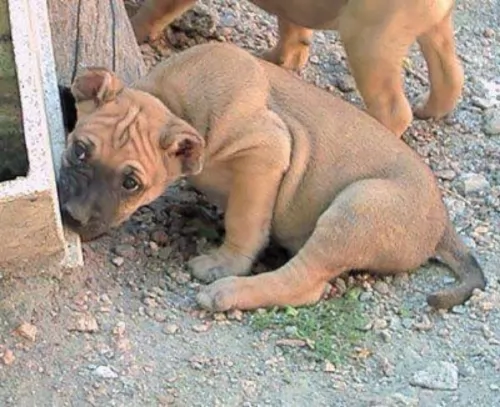 Most dogs, when they are well cared for, don’t get sick often. The Cimarrón is a robust kind of dog but even so he can get any one of the many common dog illnesses there are such as hip dysplasia, bloat, dental disease, cancer, obesity and others.
Most dogs, when they are well cared for, don’t get sick often. The Cimarrón is a robust kind of dog but even so he can get any one of the many common dog illnesses there are such as hip dysplasia, bloat, dental disease, cancer, obesity and others.
This infection can make your dog restless and you will notice your dog trying to wee often but unable to. It can be terrible watching your dog battling, and you will need to get your pet to the vet soon.
Your dog can pick up parasites anywhere such as ticks ad fleas. There are also internal parasites such as tape- and heartworms. They can bring your pet down, making him lethargic and nauseous, so it is best to research canine parasites so you can know what steps to take to protect your dog.
Don’t for one minute think that skin problems are a minor ailment. The pain and itching can drive your dog to despair. The skin can be red, inflamed and oozing. There are so many things that can cause your pet to get a skin allergy and you will need to get him to the vet to get some kind of relief for him.
 The Norfolk Terrier’s hard, wiry, straight coat requires being hand stripped about twice a year by hand or with a stripping knife. The paws will also need to be trimmed.
The Norfolk Terrier’s hard, wiry, straight coat requires being hand stripped about twice a year by hand or with a stripping knife. The paws will also need to be trimmed.
It is recommended to keep the hair short around the anus for hygienic purposes and the tail itself will need to be stripped.
The Norfolk doesn’t shed his coat naturally, and the hair keeps growing, making the dog uncomfortable and ungroomed looking. The dog will certainly need to have his hair kept away from around the eyes.
If you don’t want to strip your dog, there are people who take their dogs to professional groomers, but then this professional grooming makes it that the texture of the dog’s coat changes from wiry to soft.
Small dogs are prone to dental problems, so check your dog’s teeth regularly. A bad tooth can play havoc with your dogs general health.
As with any other dog, the Norfolk Terrier will do well on high-quality kibble, specially formulated for small dog breeds. For a tasty treat, boil some chicken and vegetables such as sweet potato, carrots and spinach in a pot, chop them up and add to his kibble with some brown rice and pasta. A tiny bit of raw meat added in occasionally is all this little dog needs to stay healthy and content.
Don’t ‘treat’ him by giving him chocolates, chips and peanuts. You will upset his stomach. Dogs do best on simply, healthy, tasty diets such as mentioned above. Make sure he has a constant supply of fresh, cool water.
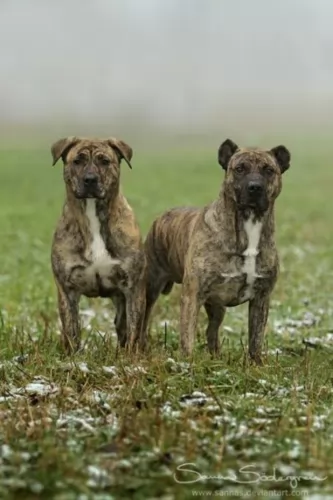 As a high energy, intelligent dog, the Cimarron Uruguayo needs plenty of exercise. He won’t be content to sit around and will be frustrated and even destructive if he doesn’t receive lots of attention and exercise. Daily walks will be imperative as well as other forms of physical and mental stimulation.
As a high energy, intelligent dog, the Cimarron Uruguayo needs plenty of exercise. He won’t be content to sit around and will be frustrated and even destructive if he doesn’t receive lots of attention and exercise. Daily walks will be imperative as well as other forms of physical and mental stimulation.
Your Uruguayan Cimarron is a low maintenance dog because of the short coat which will still require brushing twice a week as he does shed quite a bit. Other forms of grooming include nail clipping, checking the ears and teeth as both of these can become seriously infected if not checked and attended to.
If you have a Uruguayan Cimarron dog as a pet, you will need to be looking at the best food for him as he is large and energetic. There are some excellent commercially manufactured dog foods on the market and you want to be sure that you read the ingredients list so that the food can benefit your pet.
It’s never a good idea to just go on and on feeding your pet kibble. A break every now and again can do your pet the world of good. Some home-made food such as boiled chicken, brown rice or pasta and some cooked vegetables such as sweet potato, carrots and spinach will delight your dog when added into his kibble occasionally. He loves the tasty simplicity of such a diet and will never have to worry about digestive problems.
For such a dog, some raw meat added in from time to time will also do him good. Make sure he always has access to fresh, cool water.